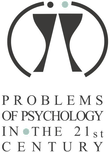THE MARITAL STATUS AS PREDICTOR OF DIFFERENCES IN TIME PERSPECTIVE AND OPTIMISTIC-PESSIMISTIC ATTITUDES AMONG WOMEN
| Title | THE MARITAL STATUS AS PREDICTOR OF DIFFERENCES IN TIME PERSPECTIVE AND OPTIMISTIC-PESSIMISTIC ATTITUDES AMONG WOMEN |
| Publication Type | Journal Article |
| Year of Publication | 2017 |
| Authors | Angelova, N, Trencheva, M |
| Journal | Problems of Psychology in the 21st Century |
| Volume | 11 |
| Issue | 1 |
| Start Page | 6-14 |
| Pagination | Continuous |
| Date Published | December/2017 |
| Type of Article | Original article |
| ISSN | 2029-8587 |
| Other Numbers | E-ISSN 2538-7197 |
| Keywords | marital status, optimism - pessimism, time perspective |
| Abstract | The search for relations, dependencies, and influences between marital status and mental phenomena outlines an accurate and clear picture not only of the family status as a social phenomenon but also as a mental field, where our awareness as individuals is directly or indirectly linked. In this sense, the differences among women with different marital context and the optimistic and pessimistic attitudes as well as the expectations regarding the past, present, and future that were investigated in this research. |
| URL | http://oaji.net/articles/2017/444-1515690356.pdf |
| DOI | 10.33225/ppc/17.11.06 |
| Refereed Designation | Refereed |
| Full Text |
